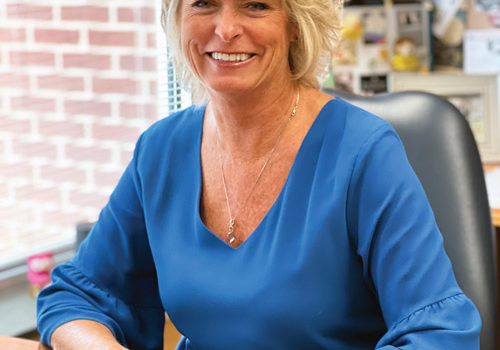
For the most part, Tammi Hickman grew up in the New Whiteland area, where she graduated from high school, but her roots go back to Fleming County, Kentucky, where a lot of her extended family still lives. As a result, “I’m always proud to say I’m a Kentuckian at heart,” she says.
Recently, Tammi and her husband Steven relocated from New Whiteland to Franklin, where she was already working. When she is not spending time with daughters Farin and Caitlyn, and new grandson Jackson, she and Steven enjoy boating, traveling, riding roller coasters at amusement parks and participating in ghost tours.
“I love ghost stories and I love to do ghost tours,” she says. “The very first one we ever did [was] when our girls were just toddlers. We took a trip to Williamsburg, Virginia. We had a tremendous storyteller.” She says that having a good storyteller on one of these tours is key because they “can suck you right in.”
In addition to her hobbies, Hickman is passionate about helping abused and neglected children. This desire to help is why she became a Johnson County court appointed special advocate (CASA) volunteer 21 years ago and has been the director of the program for the past 16 years.
What is the CASA Program? Why is it important to the community and its children?
In Johnson County, CASA is a court-supervised program that was established 34 years ago. It allows specially-trained community volunteers to be appointed as advocates for abused and neglected children in the county. We’re in the top five as far as when other programs were started, so we’re one of the older ones in Indiana.
When the CASA program launched, it was a judge’s discretion regarding which cases a CASA would get appointed to. In 2006, Indiana legislation changed to make it statutorily required in all abuse and neglect cases. Some state programs are funded and supervised by the county, and some are nonprofit. It’s a court program in this county, so I report to whomever is sitting on the circuit court bench.
The CASA program is so important because there is no other entity in the court system that is solely focused on the child. Since the child is — for lack of a better word — the victim in these cases, representing their best interests is paramount to a successful resolution of these cases.
I have a deep appreciation for the judges who are my supervisors and support Johnson County CASA. In the organization’s 34 years of advocacy, they continue to back our efforts to help the children we serve.
What do you do in your role as director?
There are so many things I do. I started as a volunteer, and I still work cases. I am responsible for training all CASA volunteers. I also market the program to advertise it and to bring volunteers in and keep them involved. I report directly to the judges who utilize our organization, so I am the first contact between them and my volunteers.
The CASA program isn’t about me as director. This program is only successful because of the love, time and attention that the volunteers bring to the table for these children.
What are some of the more challenging and rewarding aspects of your role and the work your organization does?
The most challenging thing overall is the topic in which we are assigned: These are child abuse and neglect cases; therefore, every case we get involved in starts off with a sad story. Doing our best to protect the children and trying to prevent future trauma is our number one endeavor. For me personally, supporting my CASA volunteers, but also being their behind-the-scenes champion, is one of my most important roles. One way I do that is to keep the spirit of collaboration open between them and the Department of Child Services (DCS), which is a state agency that leads and creates the cases.
If I don’t have a CASA volunteer assigned to a child, then I feel like I’m letting that child down. There’s no one more deserving of an advocate in their corner than these children who have already experienced the worst of the worst.
The most rewarding part of our work is when we get to take part in cases that end successfully, whether that be complete reunification of a family, or the children are adopted into their new forever family. Whatever outcome is in the best interest of the children is a pretty satisfying feeling.
Who can be a CASA? What sort of training or experience is required? What other ways can a person get involved with your organization?
To become a CASA volunteer, also called guardian ad litem (GAL), an individual must be over 21 and be able to pass criminal and background checks. The individual cannot have previous DCS involvement, meaning there can’t be a case against them and they can’t be on the child abuse registry.
The Johnson County CASA program follows the national CASA/GAL Association guidelines, which requires 30 hours of training in state statuses and report writing, to name a few. The main goal of the volunteer is to reduce the additional trauma on the child by doing research, and spending time with and speaking up for the child in court so they don’t have to be there.
In addition to being a CASA volunteer, individuals can help the organization through clothing and monetary donations. Throughout the year, I collect new clothing in all different sizes to give to kids who need them. A large women’s sewing circle makes fabric bags, so kids have something to put their personal items in since a lot of them don’t have anything to use. There’s an organization that provides hats, pajamas, school supplies and other items. I accept a lot of donations. As long as they’re new, I don’t turn them away. I want the absolute best for the kids we advocate for — I want them to have items that are their own — so I don’t accept used items.
Every year in December, Johnson County CASA hosts a Christmas party for all the kids we’re appointed to. A handful of organizations will assist with offsetting costs by donating new clothes, books and toys. The local bar association has been generous in the past by helping out. We also do a little fundraising. During the event, there’s a nice dinner served and Santa Claus appears. A professional photographer takes pictures of the kids with him, and stockings and gifts are handed out. The party is the biggest thing we do every year.
Donations of clothing, toys and books can be dropped off at the office or coordinated by contacting me at 317-346-4561 (my office phone number) or [email protected]. Monetary donations can be made through the county auditor’s office, which allows us to set aside funds for specific needs the kids may have.
What do you love about living and working on the southside?
There is absolutely no way to describe living in Franklin without recognizing the generosity and friendliness of Johnson County residents. Even if I had my pick of living somewhere else in Indiana, I would stay right where I am. I love living in Franklin; I feel like I have the best of all the worlds.
The windows in my office look at the courthouse. I get to stare at that magnificent, beautiful building every day. As challenging as my work is, I’m surrounded by the best CASA volunteers, the best judges and the best attorneys. I’m living my dream every day.
To learn more about the Johnson County CASA program, and how you can get involved and/or donate, go to www.casajohnsonco.org. More information about the national CASA/GAL organization is available at https://nationalcasagal.org/about-us/.


